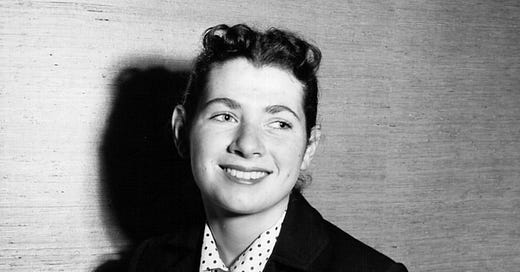A Portrait of Claudia Bushman
The pioneering historian of Mormon women turns the camera on herself
Women always apologize for writing their own stories, so I’m not apologizing, and I don’t think you should apologize for writing your own stories.
– Claudia Bushman
I read and thought about Claudia Bushman’s recent autobiography while other memoirs swirled about my mind. I became obsessed with Joan Didion’s three memoirs early last year and feel an unending desire to write as sparsely as she does. And then, just weeks after finishing Claudia’s book, I read James Carroll’s American Requiem—a stunning account of war, family, and theology. And then I read Ketanji Brown Jackson’s memoir—less stunning rhetorically, but detailing an impressive life.
And almost every day during my son’s naptime, I have been hunting around FamilySearch for memoirs of deceased relatives, having recently felt a pull to know their stories. In an unlikely twist, I came to care deeply about my mother’s paternal grandfather, John Devon Ford, a game warden who ran the Springville Fish Hatchery and struggled with an addiction to alcohol. I was moved by how he loved his mission to the British Isles and by the kind way he treated his stepmother. I was saddened by the marriage he had with my great-grandmother Audrie, but respected his willingness to admit his mistakes at the end of his life. I felt his presence in my home, felt that he cared that I knew about his life—a life that was unassuming and perhaps even sad, but of deep significance all the same.
And when I go to the temple, I feel like he cares about that, too. This caring came via a seventy-eight-page transcription of a life sketch that he recorded a few years before his death. The power of memoir seems to be in the way it illuminates an invisible bridge between unlikely pairs. I—a young mother and lawyer, ensconced in loving relationships, no lover of animals or hunting—and John Devon. But those bridges are too rare. And so I began to grieve all the memoirs that had never been written—especially by women, especially by my grandmothers and great-grandmothers, women whom I know so little about but with whom I feel such an innate bond. Where was Miriam’s memoir? Where was Denece’s life sketch? Lola’s? If I had come to love someone as unfamiliar and rough-hewn as John Devon while reading his memoir, think of what theirs would have meant.
But they aren’t there.
Claudia Bushman’s family will never suffer that same grief.
In a world marked by the absence of female forebears, the mere existence of Bushman’s memoir is cause for celebration. And of course there’s more to celebrate than just its existence!
Claudia is not afraid to state her opinion—even when it is bound to ruffle feathers. The best part of that is she ruffles feathers in both directions, thereby allowing exposure to “forbidden” ideas for all sorts of people. For example, I was unexpectedly moved by her old-fashioned take on family planning: instead of engaging in any sort of conscious decision to bring another child into the world or not, she writes, “it seemed better to regard each new child as a gift, unsought and appreciated, rather than to wait until we could be responsible parents.” And in the end, after six children, she says “we were glad to welcome these little spirits as they broke through the floor of heaven.”
Claudia is (but not often enough) delightfully transparent. For example, she includes an essay she wrote while at Wellesley College entitled “Why I Came to College.” The first sentence of the second paragraph reads: “First, I have always had a strong, secret desire to become important.” Wow. I loved that sentence. Part of the reason is that’s true for me—though I’ve never articulated it that well. But also it struck me as a sentiment many others would be reticent to announce to the world. But Claudia doesn’t have that inhibition. And that is a gift.
Finally, she offers up some poignant memories of times the church or a church leader has hurt her. She shoots straight and explains what was hard but offers up a way to tell these kinds of stories without adding additional hateful rhetoric. For example, she has an entire chapter of what it was like to be married to her husband, Joseph Smith biographer Richard Bushman, as he frequently served as a church leader. She spends significant time outlining the benefit of these kinds of callings, explaining that “the church has amassed and developed an incredible stable of wise and perceptive leaders who lead by persuasion rather than intimidation or force.” However, just pages later she’s frank about the problems. “I resent the disinterest and the lack of involvement of such leaders with their families. I resent that the church, with its vocal support of family life, divides up families regularly for jobs that they cannot share.” That last phrase is crystalline in its critique but without hate or bitterness. And to her credit, she continues to weave these things together—an ability to see the good and an ability to crystalize what caused her pain.
Claudia also describes all the houses she’s ever lived in with such love and care. She has an academic background in architecture and just was so attuned to where windows were, even in houses she hasn’t lived in for decades. It made me realize that my own grandmother (whose life history is far, far too short), also delineated her life by where she was living: the headings of her memories are addresses.
But, even with all there is to celebrate, I didn’t find the memoir completely satisfying. Since the premature losses of Kate Holbrook and Melissa Inoyue, I have been searching for other role models. I want a woman who loves keeping her covenants and is energized by them. I want a woman who grapples with the work of being a mother and a professional in another field while finding joy in both. Both Kate and Melissa offered me that. I was hoping that Claudia would as well. But mostly what I found was a longing for a bygone era of the church full of road shows and speech contests. If Claudia engaged in serious spiritual practices, they go unmentioned and do not seem to fuel her life.
Then there’s the absence of any sort of sustained reflection on the dual life of a mother and a scholar. She introduces the topic when she decides to get her PhD and have another baby—“I finally decided to do both and from then on, continued to live my rich and exhausting double life”—but never fleshes out the richness or exhaustion inherent in such a choice. She says she knew another young mother who started graduate school but then decided that the combination was too hard and wasn’t worth the effort, contrasting that perspective with her own feelings: “I had to go to school and was willing to compromise on both sides to do it.” What did those compromises look like? I never got enough of the details here!
Those two themes, vital spirituality and the dual demands of parenthood and profession, were what I most wanted to read about, so the fact that they were missing, or in the latter case, underdeveloped, was a great disappointment.
And yet, months after reading this book, as I finally finish this review, here is the passage that has lodged itself in my mind. “Clarissa’s [Claudia’s daughter] husband, Charles, disliked visiting us because, as he said, all we ever did was wash dishes and sing, which was a pretty good description of our life.” That critique describes the type of home I would love to visit, the type of people I would love to befriend. And therein lies the magic of not only memoir, but of Claudia herself.







Wish Richard and Claudia had been a little less indifferent toward nonblack LDS scholars of color, and the history they write.
You sum up well. With scarcely enough minutes in a day, I too look for something inspiring and uplifting, and appreciate the heads up. With all the depth in the gospel fulfilling intellectual pursuits, perhaps the roadshows, the singing and music provided the social aspect of life they needed. Surely though, life had more depth to it. Whether it is a biography of the Prophet or one's own memoirs, it seems that people could write something that is not merely factual, not merely historical, and not merely interesting, but something that is inspiring, uplifting and faith-building at the same time. Life is too short, and Satan's wiley ways and sophistry too enticing to many people these days to spend our time on the merely accurate and interesting, what's passed off as "scholarly" but misses the essence of the person. (One must question one's scholarship when they miss the essence of the person or the magnitude of his contributions.) We need biographies and memoirs of faith, and faith promoting that motivate us to continue forward. When the Bushman's edit and republish their works with this in mind I'll be the first one to buy a copy. Surely the Bushman's have it in them, but do their children and others know this?